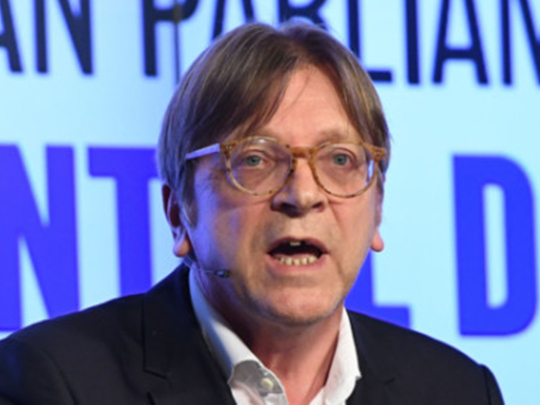
Brexit really does mean Brexit. British Prime Minister Theresa May’s long-awaited speech earlier this week finally outlined some of her government’s negotiating objectives.
Now we know that Britain wants to leave the European single market it helped to create, the customs union, and the European Union as a whole. With only a few weeks left to the likely invoking of Article 50, triggering the start of talks on Britain’s withdrawal, this clarity was much needed and will help European Union (EU) governments and the European parliament to prepare for the discussions to come. I have no doubt, however, that the process Britain and the EU are about to embark on will be a challenging one.
The EU will work in a frank and open manner to help deliver a Brexit that is least harmful for all concerned, but we must be honest with each other too: The days of United Kingdom cherry-picking and a Europe a la carte are over.
Contrary to the deeply unhelpful comments by the British Foreign Secretary, Boris Johnson, on Wednesday, who suggested that French President Francois Hollande was trying to “administer punishment beatings” in the manner of “some World War Two movie”.
No one in Europe wants to “punish” either Britain or the British.
I have never heard any member of European parliament or European leader call for this, in private or public. But it is an illusion to suggest that the UK will be permitted to leave the EU, but then be free to opt back into the best parts of the European project, for instance by asking for zero tariffs from the single market without accepting the obligations that come with it.
I hope that British people will see from the perspective of a EU taxpayer how unreasonable this would be. I am the first to recognise the importance of May’s statement on the need for close cooperation on security matters, both internal and external.
We will have to find a way to cooperate on anti-terrorism and defence in a structured and systemic way. As she made clear in her speech, Britain is leaving the EU, not Europe.
We face a long list of shared security threats. One of the most pressing priorities will be to find a solution to the intolerable situation of many EU citizens working and living in the UK and, likewise, the millions of British citizens currently resident in other EU countries.
This will be priority for the European parliament, as soon as notification over Article 50 is received and negotiations begin. But many of my colleagues are simply bemused by the UK government’s threat to deregulate its economy, or walk away from negotiations, if the UK’s goals are not delivered.
I would suggest that using the threat of tax instruments or warning of economic self-harm to achieve one’s aims is a very unproductive negotiating tactic.
May’s declaration that the UK remains committed to a strong, stable and prosperous EU rather than an unravelling one was welcomed by many in the rest of Europe.
But if her words are to be believed, they must now be backed up with concrete actions. The views of US President-elect, Donald Trump, and the hybrid war involving cyberattacks and disinformation and political subversion being waged against the West by Russia pose a profound threat to both the Brussels and London governments.
It is increasingly clear that both now seek the disintegration of the EU. Trump admitted as much when he suggested that more countries would leave the union following Britain’s departure.
What he really meant was: I hope they do. It is likely the new US president will nominate an ambassador to the EU who has only one quality — being a Brexit enthusiast.
This is a remarkable turning point in the American approach towards Europe. But I don’t see why chaos on the continent would be in the interests of Britain.
Post-Brexit, I hope that the UK and the EU can work together to defend what remains of the liberal democratic order. One of the greatest challenges in the forthcoming negotiations will be the acute need to find a solution for Northern Ireland and the Republic of Ireland, so that a new hard border dividing them is avoided.
I am committed to doing my upmost to ensure, from the EU side, that the specific needs of Ireland and Northern Ireland are prioritised in the negotiations to come. Here again, Britain and the EU must work together.
It would be a tragedy if Brexit reversed any of the progress towards peace and reconciliation made in recent years, but much work must be done to square this circle and deliver a viable solution on the ground.
Brexit will be a sad, surreal and exhausting process. The EU must use the UK’s departure to reform and move forward. Britain can choose to be a partner in this process, or it can be an impediment to it. Let us hope for a future relationship based on trust and genuine partnership.
— Guardian News & Media Ltd
Guy Verhofstadt was the prime minister of Belgium from 1999 to 2008










